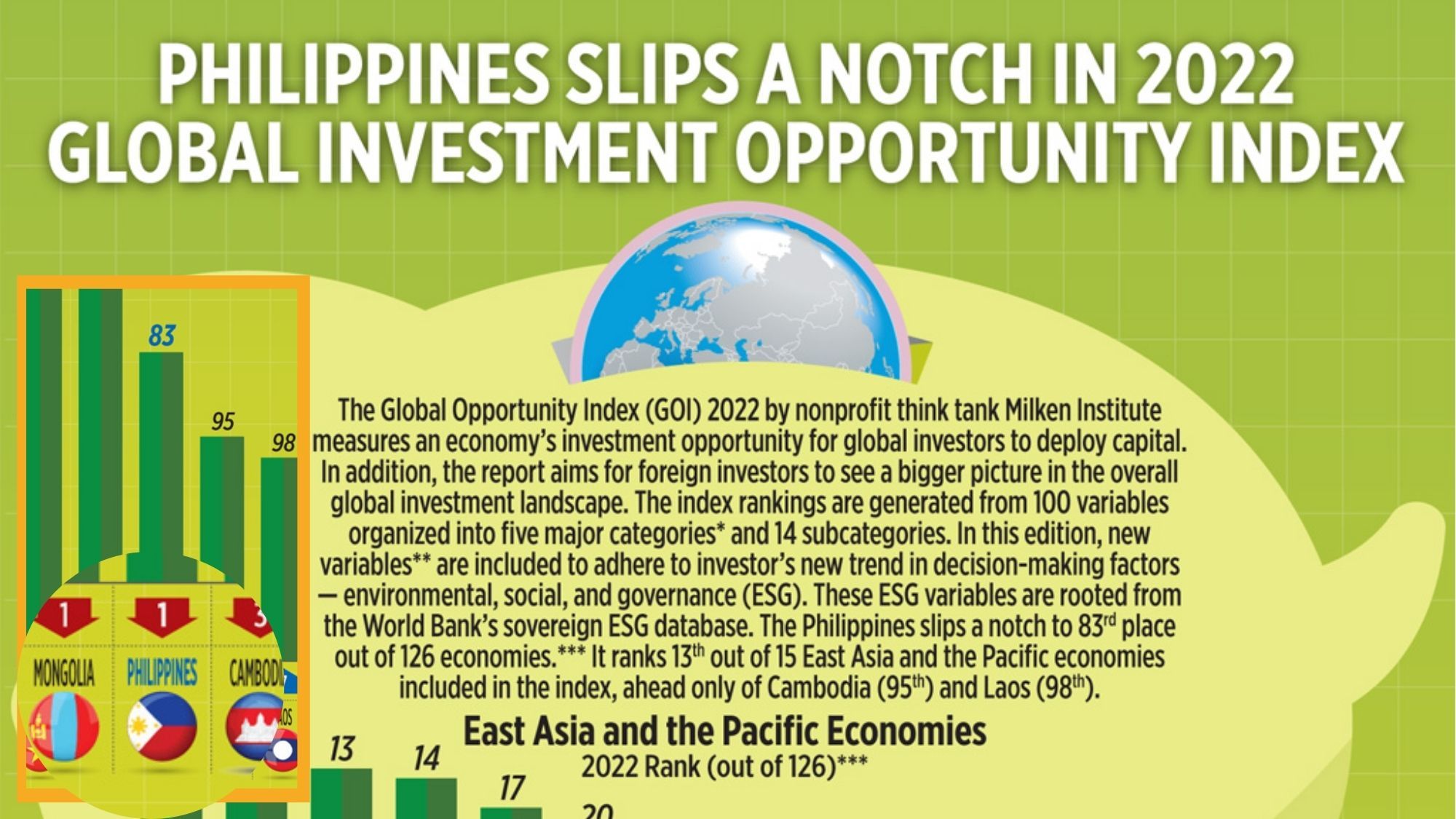Even with all the legislative and administrative reforms initiated by the government, the Philippines still lags behind its Asian neighbors in the annual Global Opportunity Index of US think tank Milken Institute in 2022, slipping from 82nd place to 83rd place.
DESPITE all the legislative and administrative reforms to make the country’s investment climate attractive to foreign investors, the Philippines still slipped to 83rd place, from 82 the previous year, in the annual Global Opportunity Index of the Milken Institute.
As a result, it still lags big time behind Asian neighbors in terms of attracting foreign investors.
Slipping
In the Global Opportunity Index 2022, the Philippines ranked 83rd out of 126 countries, slipping one spot from the 82nd spot out of 145 countries in 2021.
Some countries were excluded in the 2022 index due to insufficient data, Business World explained.
Malaysia ranked 25th, taking the top spot in “emerging Southeast Asia.” Thailand followed at 34th spot, while Indonesia and Vietnam ranked 57th and 67th place, respectively.
The Philippines was only ahead of Cambodia and Laos, which ranked 95th and 98th, respectively.
Economic performance
The Milken Institute noted that emerging Southeast Asia’s scores compared favorably with other emerging and developing economies in terms of its strong economic performance, highly qualified workforce, and strong integration with the global economy.
Based in Sta. Monica, California, the Milken Institute is an independent economic think tank that publishes research and hosts conferences that apply market-based principles and financial innovations to social issues in the US and globally.
The annual index ranks countries based on business perception, economic fundamentals, financial services, institutional framework, and international standards and policy. For 2022, the Milken Institute included new variables related to environmental, social, and governance (ESG).
In the 2022 index, the Philippines was in 82nd place in terms of business perception, which measures the issues faced by businesses and ease in resolving disputes.
It ranked 77th in economic fundamentals, which refers to a country’s macroeconomic outlook, workforce talent, and potential for future innovation and development; and 95th in financial services.
Institutional framework
The Philippines also placed 95th in institutional framework or the extent on which a country’s institutions assist or hamper business activity; and 67th in international standards and policy which gauges the integration of a country within the international community.
“Governments in the region must strengthen their institutional frameworks, deepen regional integration to take advantage of each country’s unique resources and opportunities, and maximize social impact by leveraging global capital flows to advance development,” Claude Lopez, head of the Research Department at the Milken Institute, said in a statement.
Rizal Commercial Banking Corp. Chief Economist Michael L. Ricafort said that the Philippines can improve its ranking by allowing the economy to further reopen amid the pandemic.
“(The country’s rankings) can improve with the further reopening of the local economy towards greater normalcy amid accelerated vaccination towards herd immunity by early 2022 as also aided by increased government spending especially on infrastructure that would help improve economic growth and development,” he said.
Ricafort said improving foreign policy, continuation of legislative and fiscal reforms, anti-corruption measures and ESG standards would help attract more investments in the Philippines.
Calixto V. Chikiamco, Foundation for Economic Freedom president, said that the country has made progress in approving economic reforms that would boost foreign investments.
These include the amendments to the Retail Trade Liberalization Act, which was already signed into law and amendments to the Public Service Act (PSA), which would open more sectors to 100% foreign ownership. The PSA measure is now awaiting President Rodrigo R. Duterte’s signature.
“Hopefully, the next administration will build on these investment-friendly laws by continuing the ‘Build, Build, Build’ program, addressing inflation by tackling our food production problems, and building up energy capacity and security,” Chikiamco said.
Ranking to improve this year
Chris Nelson, British Chamber of Commerce Philippines executive director, said that the Philippines’ ranking will improve this year with the recent economic reform measures and participation in the Regional Comprehensive Economic Partnership (RCEP).
“Whenever the next (index) is done, I would anticipate seeing an improvement in the ranking. We remain optimistic that the Senate will ratify RCEP when it returns in May. That is going to increase the Philippines’ opportunity and attractiveness,” Nelson said.
The Senate recently went on a break for the national elections without giving its concurrence to RCEP’s ratification, delaying the country’s participation in the trade agreement.
RCEP, which took effect on Jan. 1 this year, is touted as the world’s largest trade deal, and involves the 10 members of the Association of Southeast Asian Nations (ASEAN), Australia, China, Japan, South Korea, and New Zealand.
Tags: #MilkenInstitute, #GlobalOpportunityIndex2022, #Phl., #economy
